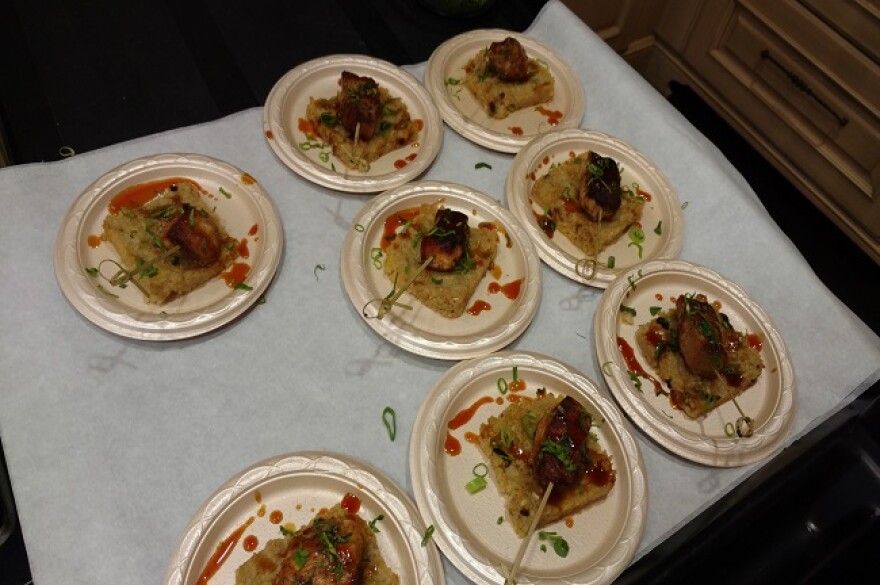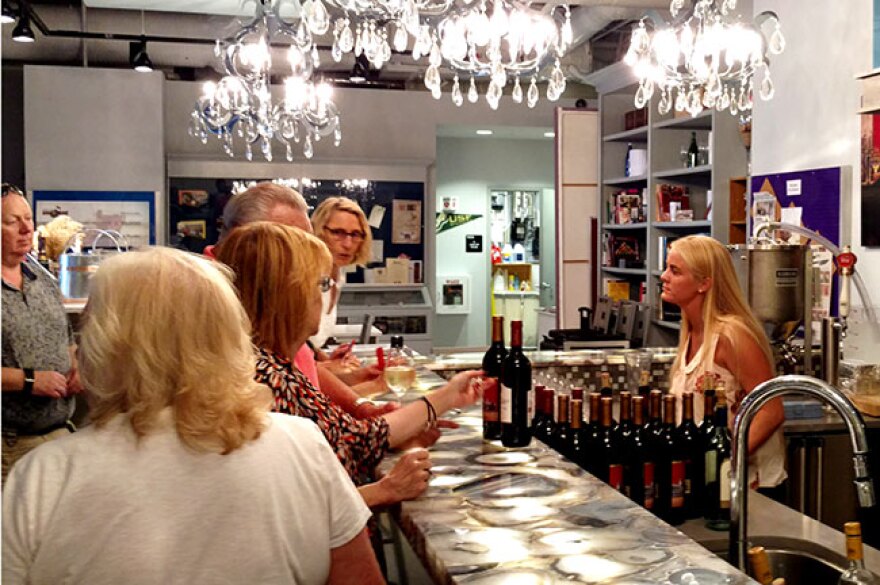There’s a storefront along Main Street in Lakewood Ranch, a planned community between Sarasota and Bradenton, where future restaurant and hospitality employees are learning their chops.
It’s the University of South Florida Sarasota-Manatee Culinary Innovation Lab, and beginning this semester, every few weeks, it transforms into the Bulls Bistro.
Dr. Pat Moreo is the Dean of the USFSM College of Hospitality and Tourism Leadership.
He helped create the Bulls Bistro concept, making it a part of the program’s Restaurant Management course.
“So this is one of the last things they do now, serving the public, they have to do all the planning of the menus, they have to do all the ordering of the food, the chefs of course help them produce the food, and they have to make money on this," Moreo said.
Chef Joe Askren directs the Culinary Innovation Lab. He said that running the operation as a bistro instead of a restaurant allows them to create an ever-changing menu of three to four bite size tapas items, usually based on a theme.
“We never do the same menu twice, so that’s kind of fun," Askren said. "Not only do the students have fun with it, the chefs do too of course, and we think it’s a darn good value – it’s a $20 ticket, and the guests are going to be able to taste three different items.”
At the Bistro we attended, Chef Garry Colpitts, the lab’s culinary services manager, built a menu featuring a trio of Mediterranean dishes, paired with two glasses of wine or two beers, including one brewed by faculty and students.
In one kitchen, underneath a pair of large monitors showing his handiwork across a large cooktop, institute chef Rov Avila assembled carne asada tacos.
“We have a lemon cream cheese made in house by Chef Garry, an Asian slaw with various vegetables – carrots, celery – and then the carne asada, which was marinated with lime, cilantro, cumin, salt, pepper. Then it gets hit with the radishes, lemon, and it’s good to go,” Avila said.
In the Tuscan-style kitchen across the lab, two other recipes were coming together.

Graduate Assistant Angad Dang was making sambal chicken – a Malaysian dish marinated over 24 hours in a combination of fish sauce, soy sauce, vinegar and a lot of spices, including star anise seed, cardamom, and black pepper.
"It goes over jasmine rice, but we’re substituting it with bulgur wheat, which is Mediterranean, but we maintain some of the traditional spices that go in there," he said.
Dang, who was a chef in India for seven years, said he likes sharing recipes from his native land with Americans – with a few modifications.
“It’s interesting when they have authentic Indian food, they’re like, ‘Wow, this is something that we’ve never had,’ because most people have Americanized, as I like to say, they’ve met in the middle but I still keep it very traditional," he said. "All I’ve changed in my food is I’ve reduced the spice level, but that doesn’t mean I don’t use all the spices. I use a lot of bold spices, but the heat, I’ve reduced it.”
The biggest lesson Dixon has learned? "You can't please everyone and do the best that you can."
At the station next to Dang, restaurant management senior Louis Meyer worked on a fish dish.
New England North Atlantic cod was sprinkled with a bit of wine and then baked on a wilted bed of arugula and watercress that was seared with pork belly.
“And once that comes out of the oven, we put it on the plate, take a little bit of yellow squash and scallion relish, sprinkle that on top," Meyer said. "Then, for a little bit of pop, we’ve got some fresh cut cucumber and a little slice of radish and then to top all of that off, just a little bit of not-so-spicy, spicy sauce.”
As part of the Bistro experience, aspiring chefs like Meyer talked directly to customers, sharing the stories behind the dishes.
“I get the skills of learning how to describe and making sure I know how to advertise the plate in a way that’s going to be the most appealing. And at the same time, see who I’m giving it to and make a little bit of a connection and reach out and really give them the experience of knowing the person that cooked their food," Meyer said.

In the bar area, hospitality management senior Rachel Dixon poured a variety of wines donated for the event. Even though she’s worked in a number of restaurants since she was a teenager, she said the hands-on experience the bistro provides is vital for students like herself.
“You definitely need experience, most of the time in restaurants and hotels, they want to hire somebody that has some general knowledge of what goes on in front of the house and back of the house, so this is definitely essential for making a career in the restaurant or hotel industry,” she said.
And the biggest lessons she’s learned in the program?
“You can’t please everyone and do the best that you can," she said, smiling.
Askren added that these kinds of experiences are key to a good hospitality program and setting their students apart.
“It gives them confidence, it improves a lot of their different skills that they need out in the industry: communication skills, working together as a team, strategic thinking – coming up with not only the initial plan, but maybe contingency plans if something does go wrong,” he said.
Since it takes place in connection with a class, there's a chance for students to debrief and compare what they've learned.
“After each event, the next class we have in that traditional classroom setting, it gives us some great hands-on experiences to talk about," Askren said. "We talk about the good, the bad, the ugly, what happened, what could have been done better, what was done great, stuff like that.”
And from a business angle, the response to the Bulls Bistro has been incredible.
“So for the very first one that we did, we had two weeks to promote it, I would have been happy with ten, twelve people," Askren said. "We ended up doing about four times that, we ended up doing forty people on the first night and we still have a few more tickets available for the rest of the events this semester, but we’re selling out quick.”
Lakewood Ranch resident Larry May attended the first two Bistro events with his wife and friends, and hope to attend the last three events this semester as well.
“It’s an opportunity to take advantage of some gourmet things that you really can’t prepare at home, we truly enjoy it immensely, and it’s well worth the small amount that you have to pay for something that you don’t ordinarily get a chance to enjoy," May said.
Tickets to the final three Bistros on October 13 and 27, and November 5 can be purchased here. The events take place from 5 to 7 p.m. at the USFSM Culinary Innovation Lab located on Main St. in Lakewood Ranch.
School officials hope to hold future bistros on a bi-weekly basis in the spring semester, starting on January 12, 2017.
You can get a look at the Bulls Bistro on University Beat on WUSF TV, Sunday, October 30 at 6 p.m.




